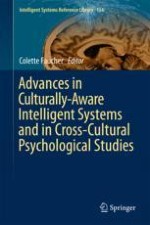2018 | OriginalPaper | Chapter
19. The Influence of Emotion and Culture on Language Representation and Processing
Authors : Dana M. Basnight-Brown, Jeanette Altarriba
Published in: Advances in Culturally-Aware Intelligent Systems and in Cross-Cultural Psychological Studies
Publisher: Springer International Publishing
Activate our intelligent search to find suitable subject content or patents.
Select sections of text to find matching patents with Artificial Intelligence. powered by
Select sections of text to find additional relevant content using AI-assisted search. powered by
